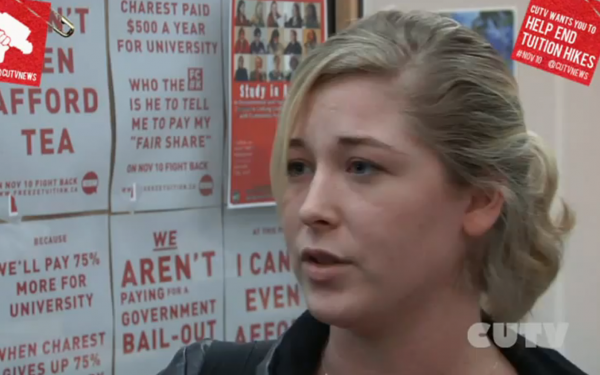Addressing Misconceptions and Inaccuracies about the Department of Political Science
In recent weeks, articles have appeared in The Link and The Concordian discussing the department of Political Science.
These articles have focused largely, but not exclusively, on the following issues: changes to undergraduate course offerings, the department’s commitment to courses on gender, diversity and equality issues and, finally, departmental governance.
The intention of this letter is to address misunderstandings and misconceptions. Further, to underscore the commitment of the department of Political Science to inclusive, transparent and collegial governance that allows faculty to present a contemporary and cutting-edge curriculum to its undergraduate students.
Curriculum vs. Scheduling
It has been suggested that courses were cut and the curriculum modified without proper consultation. We need to distinguish between the curriculum (the courses a department may offer) and scheduling (the courses offered each academic year). It is also important to distinguish between permanent and slot courses, as well as to understand the purpose of slot courses.
The curriculum of a department represents the academic mission of its members. A large department like Political Science does not offer its entire undergraduate curriculum each academic year. This occurs because of sabbaticals, leaves of absence and the desire by faculty to teach a range of courses over the academic career of undergraduate students, which allows greater diversity in our yearly curriculum offerings.
In order to ensure this diversity a department cannot offer every course each academic year. Indeed, it is normal for courses to be scheduled periodically to reflect changes in personnel and academic priorities. Deciding not to schedule a course should never be equated with cancelling a course or insufficient commitment to an intellectual perspective or tradition.
A problematic misconception, therefore, surrounds the process by which the department of Political Science implemented its current curriculum. The changes to the curriculum were implemented in 2012-2013 and were the result of a concerted, transparent and collegial exercise at the departmental level that began in 2009.
The department of Political Science, like many other departments at Concordia, has experienced a significant increase in tenure-track hiring, starting in 2000. It was necessary to engage in curriculum reform to reflect changes in the character of the department and its emerging research strengths. The best courses are those in which research is integrated into the classroom; therefore, the curriculum was revised to capture and ensure this synergy between research and teaching in a rapidly changing department.
After being approved by the Arts and Science Faculty Council in September 2011, the university’s academic programs committee in November 2011 and Senate in December 2011, a new curriculum was implemented for the 2012-2013 academic year.
This process saw the deletion of 15 courses, the addition of five new courses, and the conversion of 28 slot courses to permanent courses, for a net increase of 18 courses to our undergraduate curriculum.
We are particularly proud of this, as it significantly expanded our course offerings, allowing the faculty to deliver a contemporary and cutting-edge curriculum to our undergraduate students. This was achieved through an inclusive, transparent and collegial process.
Permanent vs. Slot Courses
The distinction between permanent and slot courses is important. Slot courses are devices by which full-time faculty create new courses with the intention of converting them into permanent course offerings during the next curriculum revision exercise.
Our department has demonstrated its commitment to the purpose of slot courses, with the recent conversion of 28 slot courses to permanent features of the current curriculum.
A Steadfast Commitment to Gender-, Equality- and Law-Related Courses
A petition that was reported on by The Link stated, “Many of the most popular courses [have been] cut from the course list—especially those in gender, equality and law—to the detriment of students who wish to pursue studies in those fields.”
In fact, the department continues to offer a large number of courses in the areas of gender, equality and law.
The department of Political Science also participates in two interdisciplinary programs that advance these disciplines: minor in Human Rights Studies, which is housed in our department; and minor in Law and Society, based in the department of History.
In addition to these interdisciplinary commitments, our department demonstrates a steadfast commitment to these subjects. Courses such as POLI 211 (Human Rights: An Overview), POLI 301 (Social Movements and Protest Politics), POLI 311 (International Public Law), POLI 324 (Parliament and the Charter), POLI 361 (Advocacy Groups and Public Policy), POLI 388 (Human Rights and International Justice), POLI 411 (Gender and Public Policy) and POLI 423 (Peace Studies and Global Governance) underscore the depth of our curriculum and availability of such courses for students that are interested in pursuing these fields.
Finally, POLI 309 (Women and Politics) and POLI 328 (Public Policy and the Politics of Equality) will be part of our course offerings in 2013-2014. These are important components of the permanent curriculum and the department continues to be committed to their place in its yearly course offerings.
Similarly, POLI 389 (Religion and Politics) was not offered in 2012-2013 due to an interdepartmental agreement, but will be offered as two sections in 2013-2014: one cross-listed with Theology and one by Political Science.
Departmental Governance and the Associate Chair.
Much has been made about the position of associate chair. The discussion surrounding this position began a number of years ago at the departmental level, and this was implemented in 2012-2013 at the request of the current chair. The misunderstandings of this position center on its creation—the chair requested its creation and sought approval at the faculty of Arts and Sciences.
Thus, the associate chair was not, as erroneously characterized in a petition reported on by The Link as “hired by the department and assigned to handle student complaints.”
Similar to other administrative positions in the department, the associate chair is appointed by the chair with responsibilities approved at the faculty level. These responsibilities are modeled on those performed by other associate chairs in the faculty of Arts and Sciences. This position has not decreased accessibility to the chair, who remains engaged with all issues delegated to the associate chair.
In closing, the department of Political Science is a dynamic teaching and research environment. Our members are committed to advancing the academic mission of our unit in the interest of our students. Our departmental practices are collegial and our decision making is transparent.
Csaba Nikolenyi,
Professor and Chair
Department of Political Science
James Kelly,
Associate Professor and Associate Chair
Department of Political Science
Stephanie Paterson,
Associate Professor and Undergraduate Program Director_
Department of Political Science_
Jean François Mayer,
Associate Professor and Graduate Program Director
Department of Political Science
Francesca Scala,
Associate Professor and Director of the Master’s in Public Policy and Public Administration Program
Department of Political Science




_600_375_90_s_c1.jpg)

